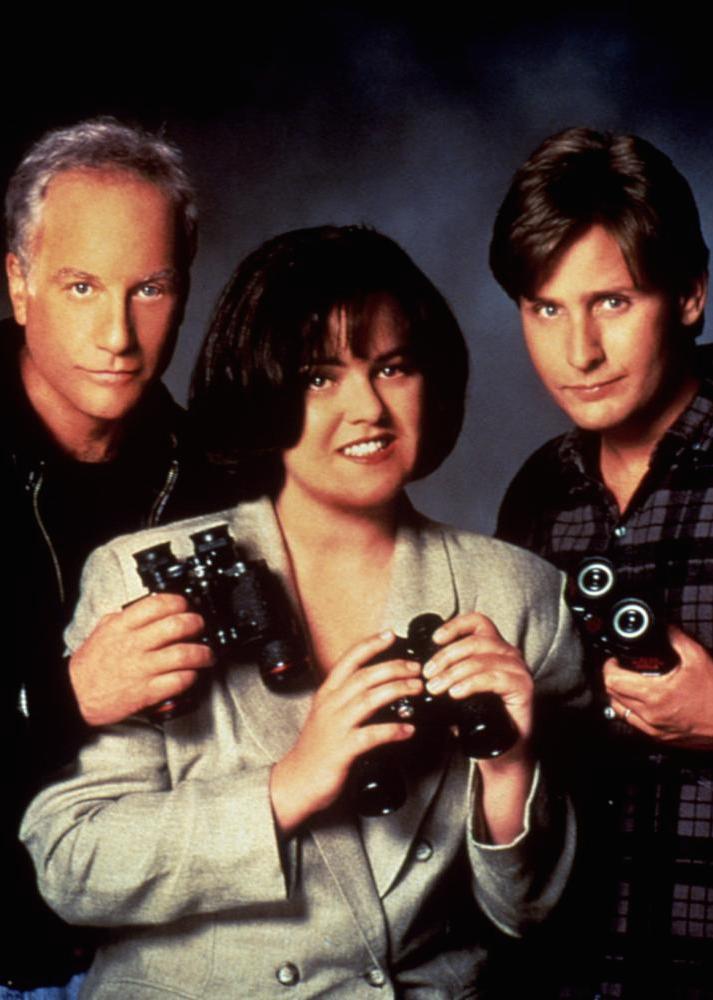Friday, July 23, 1993.
ANOTHER STAKEOUT. Written by Jim Kouf, based on characters created by Kouf in his original screenplay for Stakeout (1987). Music by Arthur B. Rubinstein. Directed by John Badham. Running time: 108 minutes. Mature entertainment with the B.C. Classifier’s warning: some violence, occasional coarse and suggestive language.
CAREER-WISE, CHRIS LECCE (Richard Dreyfuss) is in a rut.
Despite one spectacular bust six years ago, the Seattle police detective and his partner, Bill Reimers (Emilio Estevez), are still pulling dirty, dangerous duty in the downtown core. In an example of odoriferous deja vu, Lecce finds himself wrestling with a suspect in a dumpster full of rotting produce.
Supremely smelly from the encounter, the middle-aged officer is again called into his captain’s office. And, again, he is told that the feds need some surveillance work done locally.
The partners are on Another Stakeout.
Career-wise, John Badham is striking out in old directions. Earlier this year, the British-born Hollywood movie-maker offered us a remake.
His Point of No Return, seen here in March [1993], recycled the 1990 French neo-noir shocker La femme Nikita in an American setting. I thought Badham's version, a Bridget Fonda vehicle, made some genuine improvements on the original.
Another Stakeout is his first attempt at a sequel. Following up on his own successful 1987 cop show — shot in Vancouver, despite being set in Seattle — Badham encounters all the special problems of follow-on features.
“A sequel is like a dinner,” director Jeannot Szwarc told me in an interview shortly before the release of his own Jaws 2 (1978). “You invite your guests and you serve them fish.
“If you make a hit, they want to come back. This time, though, you serve steak and they are disappointed. They tell you they wanted more fish ‘but with a different sauce.’
“You fall into a trap if you try to be too original.”
Credit Badham with avoiding the originality trap. His second serving of Stakeout is different without being too different.
As in the original, it opens with a slam-bang action sequence. In far-off Las Vegas, mob hitman Tony Castellano (Miguel Ferrer) upsets federal plans to prosecute a crime boss when he goes after material witness Louella Delano (Cathy Moriarty).
Narrowly escaping death, Delano goes into hiding. Believing her to be in the Seattle area, the feds ask for local co-operation.
The original was a tension-filled thriller with comic relief. Badham's look-alike sequel, unfortunately, is more of a strained comedy with thriller elements.
On this assignment, the police partners are accompanied by an officious assistant district attorney. Ambitious Gina Garrett (Rosie O’Donnell) mistakes police surveillance for undercover work and has concocted an elaborate scenario in which she and Lecce are married, and Reimers is their adult son.
“You know what a stakeout is all about?” says the exasperated Lecce. “You sit. You listen. You watch.
“You don’t participate!”
Actually, it was inadvertent participation, and the resulting romance, that made the original film such a treat. Having already played that card, screenwriter Jim Kouf forces his characters in the direction of domestic slapstick.
Indeed, he forces it rather too far. O’Donnell, playing a character with a truly tenuous grasp of the realities of police procedure, generates little sympathy in the chaos-creating role.
Nominally “in charge” of the operation, she is less funny than annoying. Placing the emphasis on sitcom plotting actually slows the film’s pace and makes the adventure story less compelling.
It's a ‘different sauce’ that fails to improve the dish.
The above is a restored version of a Province review by Michael Walsh originally published in 1993. For additional information on this archived material, please visit my FAQ.
Afterword: Another Stakeout was the third of four theatrical feature films that John Badham shot on location in B.C. As noted in the above review, it was the sequel to his first Vancouver picture, 1987’s Stakeout (1987). He returned to make the 1990 pursuit comedy Bird on a Wire, and then again for the 2002 psychological thriller Brother’s Keeper. Though he directed a dozen genuinely interesting, financially successful movies between 1976 and 1993, he failed to win the critical attention (and cult following) enjoyed by many of his contemporaries. Since the mid-1990s, almost all of Badham’s directorial credits have been for TV movies and series episodes.
In the process, Badham has spent a significant amount of time in Canada. Of the six TV movies he’s made here, three were shot in Toronto (The Last Debate, 2000; Obsessed, 2002; and Evel Knievel, 2004), with one each in Vancouver (Floating Away,1998); Calgary (The Jack Bull; 1999), and Halifax (Footsteps; 2003). His TV series credits include work on two Toronto-based shows — Nikita (three episodes in 2012 and 2013) and 12 Monkeys (2015). Mostly, though, he’s earned his frequent-flyer points on flights to Vancouver, where he’s directed Men in Trees (2008), Psych (six episodes, 2007-2011), Arrow (2015) and Supernatural (six episodes, 2014-16). Since 2004, he’s been on the faculty of Chapman University in Orange, California, where he leads the Graduate Directing Program at the Dodge College of Film and Media. John Badham turns 77 today (August 25).
See also: Among the other John Badham features currently included in the Reeling Back archive are: Dracula (1979): Blue Thunder (1983); and War Games (1983).
